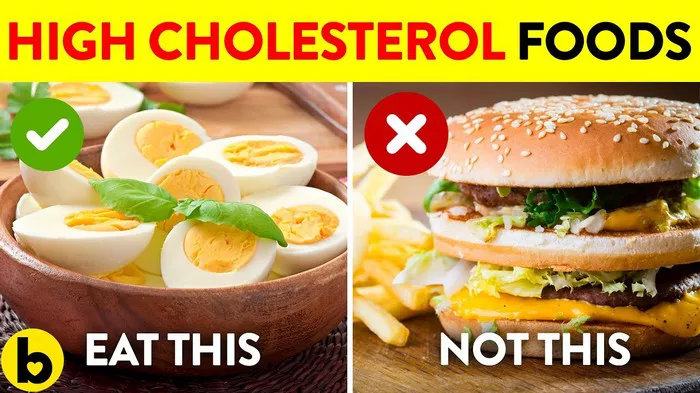High cholesterol levels can significantly increase the risk of heart disease and stroke. While genetics can play a role in cholesterol levels, lifestyle factors such as diet also have a substantial impact. Fortunately, making dietary changes can help manage cholesterol levels and improve overall heart health. In this article, we will explore the best foods to eat if you have high cholesterol, along with tips for creating a heart-healthy diet plan.
Understanding Cholesterol
Before delving into dietary recommendations, it’s essential to understand the basics of cholesterol. Cholesterol is a fatty substance produced by the liver and also comes from certain foods. There are two main types of cholesterol:
1. Low-Density Lipoprotein (LDL) Cholesterol: Often referred to as “bad” cholesterol, high levels of LDL cholesterol can lead to plaque buildup in the arteries, increasing the risk of heart disease.
2. High-Density Lipoprotein (HDL) Cholesterol: Known as “good” cholesterol, HDL helps remove LDL cholesterol from the bloodstream, reducing the risk of heart disease.
When managing high cholesterol, the goal is to lower LDL cholesterol levels while increasing HDL cholesterol levels.
Foods to Include
1. Oats and Whole Grains: Start your day with oatmeal or whole-grain cereals like barley or quinoa. These foods are high in soluble fiber, which helps lower LDL cholesterol levels.
2. Fruits and Vegetables: Incorporate a variety of colorful fruits and vegetables into your meals. They are rich in antioxidants, vitamins, and minerals that support heart health. Examples include berries, citrus fruits, leafy greens, and cruciferous vegetables like broccoli and Brussels sprouts.
3. Legumes: Beans, lentils, and chickpeas are excellent sources of soluble fiber and plant-based protein. They can be added to soups, salads, or as a side dish to boost heart health.
4. Nuts and Seeds: Almonds, walnuts, flaxseeds, and chia seeds are heart-healthy options that provide unsaturated fats, omega-3 fatty acids, and fiber. Enjoy them as snacks or sprinkle them over yogurt or salads.
5. Fatty Fish: Include oily fish such as salmon, mackerel, trout, and sardines in your diet at least twice a week. These fish are rich in omega-3 fatty acids, which can help lower triglyceride levels and reduce the risk of heart disease.
6. Plant Sterols and Stanols: Foods fortified with plant sterols and stanols, such as certain margarines, yogurts, and orange juices, can help lower LDL cholesterol levels when consumed as part of a balanced diet.
7. Healthy Fats: Opt for sources of healthy fats, such as olive oil, avocado, and avocado oil. These fats are monounsaturated and polyunsaturated fats that can improve cholesterol levels when used in place of saturated and trans fats.
8. Green Tea: Drinking green tea regularly may offer heart health benefits due to its antioxidant properties. It can help improve cholesterol levels and lower the risk of cardiovascular disease.
Foods to Limit or Avoid
1. Saturated and Trans Fats: Reduce intake of foods high in saturated fats, such as fatty meats, full-fat dairy products, and processed foods like pastries and fried foods. Also, avoid trans fats found in partially hydrogenated oils commonly used in processed snacks and baked goods.
2. Added Sugars and Refined Carbohydrates: Limit consumption of sugary beverages, sweets, and foods made with refined flours. These can contribute to weight gain and negatively impact cholesterol levels.
3. Excessive Alcohol: While moderate alcohol consumption may have some heart benefits, excessive alcohol intake can raise triglyceride levels and contribute to high cholesterol. Limit alcohol to recommended amounts or avoid it altogether.
4. High-Sodium Foods: Limit sodium intake by reducing processed and packaged foods, canned soups, and salty snacks. High sodium intake can elevate blood pressure and increase the risk of heart disease.
Tips for a Heart-Healthy Diet
1. Read Labels: Pay attention to food labels and choose products low in saturated fats, trans fats, and added sugars. Look for items with high fiber content and minimal sodium.
2. Cooking Methods: Opt for healthier cooking methods such as grilling, baking, steaming, or sautéing with minimal oil. Avoid deep-frying and excessive use of butter or lard.
3. Portion Control: Be mindful of portion sizes to avoid overeating, especially with calorie-dense foods. Use smaller plates and bowls to help with portion control.
4. Stay Hydrated: Drink plenty of water throughout the day. Limit sugary beverages and opt for water, herbal teas, or infused water with fruits and herbs.
5. Regular Physical Activity: Combine a heart-healthy diet with regular physical activity for optimal cardiovascular health. Aim for at least 150 minutes of moderate-intensity exercise per week.
Conclusion
A heart-healthy diet plays a crucial role in managing high cholesterol and reducing the risk of heart disease. By incorporating nutrient-rich foods like whole grains, fruits, vegetables, legumes, nuts, seeds, and healthy fats while limiting saturated fats, trans fats, added sugars, and sodium, you can support your heart health and overall well-being. Consult with a healthcare professional or registered dietitian for personalized dietary recommendations based on your individual health status and goals.


